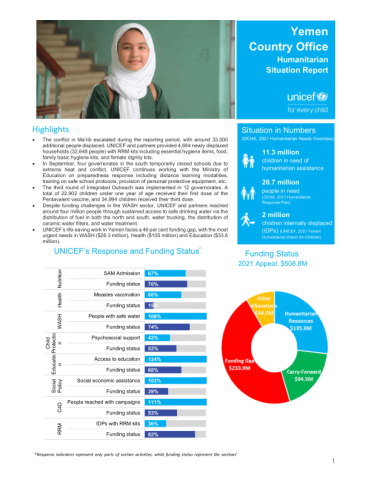Washington Has Yemen Policy Backward


In a recent interview with CNN’s Fareed Zakaria discussing the war in Yemen, U.S. Secretary of State Antony Blinken asserted that “the Saudis have been engaged productively in trying to bring this war to an end.” He criticized the Houthi rebels, known formally as Ansar Allah, who “continue to hold out” by not agreeing to negotiate. His statements reflect the official U.S. stance, yet they betray either a lack of information or a refusal to accept the reality on the ground: The Houthis have defeated the Saudis.
When Saudi Arabia’s then-Defense Minister Mohammed bin Salman launched Operation Decisive Storm against the Houthis in March 2015, he assumed the military operation would bring an easy victory that would help confirm his eventual promotion to crown prince and future king.
Instead, it became a public relations debacle, as Saudi Arabia not only publicly brutalized a desperate and impoverished population but also proved incapable of defeating a “ragtag” group of rebels despite billions of dollars of U.S. military hardware. The Saudis’ recent willingness to negotiate a cease-fire reflects their weakened position.
Yet the reason the Saudis feel ready to engage and the Houthis do not lies in the terms of the negotiation. Blinken failed to acknowledge that the Saudis’ cease-fire proposal, as well as the terms offered by U.S. Special Envoy for Yemen Tim Lenderking in March, impose harsh terms on the Houthis. The U.S. and Saudi claim that they are pursuing peace is less than honest, because the plans they’ve offered the Houthis could encourage them to keep fighting rather than accept a truce.
To end a war, the victors usually dictate terms to the losers. Imposing maximalist demands on the victors is futile: They will simply continue fighting.
To understand today’s impasse, some diplomatic history is essential. The framework for all international negotiations on Yemen remains United Nations Security Council Resolution 2216. The Security Council passed Resolution 2216 in April 2015, just after the Saudis led a military coalition to try to expel the Houthis from territories they had seized.
The resolution defines the Houthis as the primary belligerent in Yemen’s conflict. It established a U.N. mechanism to review imports to Yemen in order to prevent Iran from smuggling weapons to the Houthis, which Saudi Arabia uses to justify its ongoing blockade. Most significantly, Resolution 2216 demands that the Houthis relinquish their weapons and territorial gains. But, given the present situation on the battlefield, the Houthis will reject any negotiation based on these outdated terms.
Resolution 2216 reflects conditions in Yemen six years ago, when it still seemed possible for Yemen to return to a U.N.-supported political transition process that the Houthis disrupted by seizing Sanaa in late 2014. It does not reflect today’s balance of power.
The U.N. and the Gulf Cooperation Council became involved in Yemen’s political transition following months of Arab Spring protests throughout 2011. At their urging and in exchange for amnesty, Ali Abdullah Saleh eventually relinquished Yemen’s presidency in February 2012. Saleh’s political party backed his vice president, Abed Rabbo Mansour Hadi, who ran unopposed in a presidential election that the Houthis and southern separatist groups boycotted.
Hadi was to serve as interim president for two years and oversee Yemen’s democratic transition, including its National Dialogue Conference from March 2013 to January 2014. The National Dialogue intended to establish the framework for a new constitution, and its inclusion of women and young people received international praise.
Yet the outcome of the National Dialogue did not satisfy the Houthis nor southern separatists, groups that had been marginalized under Saleh’s rule. Saleh had defeated southern separatists in 1994 when the former South Yemen tried to secede, and he largely excluded them from power. Likewise, between 2004 and 2010, Saleh fought a series of wars with the Houthis to crush their growing movement. After he was ousted from power, Saleh aligned with the Houthis to try to reclaim control. The Houthis accepted Saleh because he bolstered their forces with units of the Yemeni military still loyal to him, although they assassinated him in 2017 after he tried to betray them.
With Saleh’s support, the Houthis took control of Sanaa and forced Hadi to resign. After fleeing to the Yemeni city of Aden and later to Riyadh, Saudi Arabia, Hadi rescinded his resignation, but since 2015 he has been president in name only. He requested that the Saudis intervene, an action that the U.N. Security Council affirmed with its subsequent resolution. The Saudis justify their actions in Yemen as intended to reinstate Hadi, as Resolution 2216 stipulates.

Yemeni officials on Monday condemned arrests and prosecutions by the Iran-backed Houthi militia directed against media, journalists and celebrities…

Yemen's warring parties are gearing up for new waves of conflict in 2023 amid a lack of decisive steps towards sustainable peace, adding to the suf…

The UAE will help to recruit doctors and deliver crucial supplies for hospitals in Yemen under a major healthcare drive. The Khalifa bin…